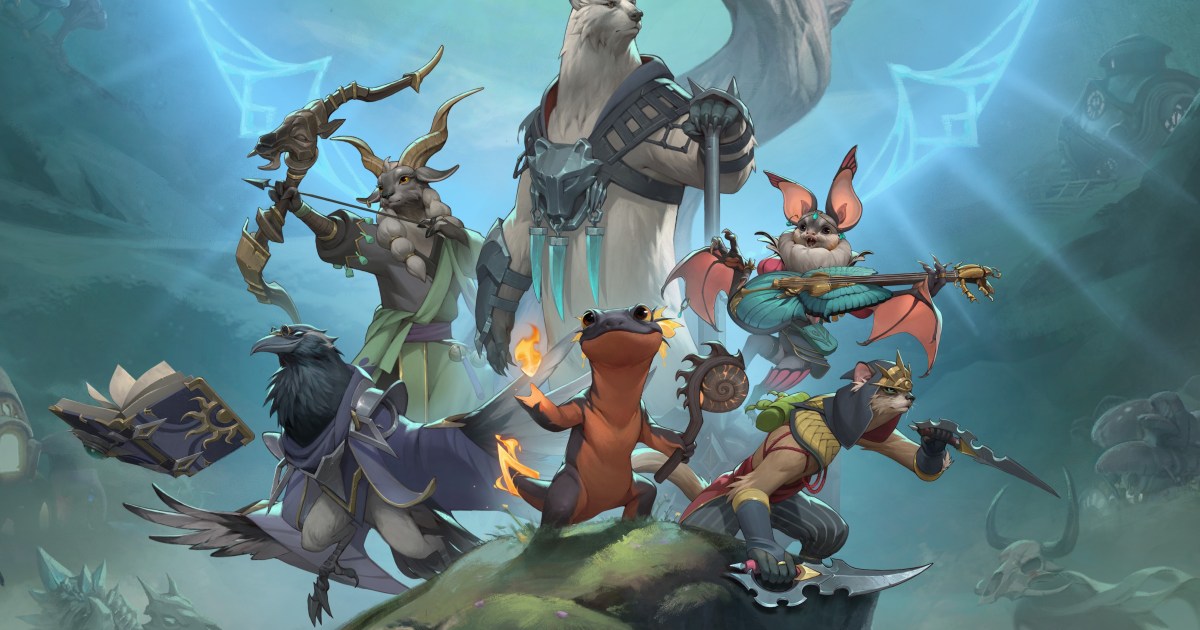When I hang out with my friends for a game night, we usually do one of two things: play Dungeons & Dragons or a party video game that works with just our phones. The iconic tabletop RPG provides the sandbox for an infinite number of campaigns for my friends to venture through, while Jackbox and King Of The Castle offer variety depending on the actions or answers we provide as players. Sunderfolk is a new game from Dreamhaven that’s finding the middle ground between the two.
Blizzard Entertainment founder Mike Morhaime and others from the World of Warcraft studio founded Dreamhaven in 2020, and it’s finally ramping up to release games such as Lynked: Banner of the Spark and Sunderfolk. Sunderfolk specifically is a card-based tactical RPG set in a fantasy world where animals fight to defend the underground village of Arden from a variety of fantastical threats. The twist is that each player controls their character and cards played from a dedicated phone app that connects to Sunderfolk on PC and console.
Digital Trends flew out to Los Angeles to test out Sunderfolk in person ahead of its reveal, and I came away confident that it will be the next video game I add to my game night rotation with friends. It takes some getting used to, but after some playtime, I understood that developer Secret Door wanted to streamline the feeling of playing a tabletop RPG with others. To do so, it drew from games like Jackbox Party Pack just as much as tabletop RPGs.
Opening a Secret Door
Chris Sigaty is best known for his work at Blizzard Entertainment on games like Warcraft III and StarCraft II. In an interview, Sigaty tells Digital Trends that he and many other Blizzard veterans felt that they were “at these junctions in our careers where it made sense to move on to something else.” Sigaty says he felt “entrepreneurial” after being at Blizzard for so many years, so he started the studio Secret Door under the banner of Morhaime’s Dreamheaven.
Sigaty wanted to make something cooperative, not competitive, like much of his work at Blizzard. He also has a deep love for tabletop games, but understands that the amount of setup sometimes required for them can make some games inaccessible for more casual players. With Sunderfolk, Secret Door wanted to provide an approachable RPG game backdrop for those who may want to play a game together, but don’t want to commit the time necessary for setup.
Game director Erin Marek has a background in biology and a love for tabletop games, so she was also drawn to this tabletop RPG-inspired game about animals. “This is everything I ever wanted to be able to play as a player,” Marek says. The team played a lot of different tabletop and phone-based party games for inspiration, and Sunderfolk is an amalgamation of what they enjoy.
How Sunderfolk works
Structurally, Sunderfolk is split into three acts and around 38 levels. Players can create a party of up to four characters at the start of a campaign. Each is represented by a different animal and falls into an RPG archetype. My favorite was a salamander Pyromancer who could light tiles on fire with their magic attacks and then step into the fire to get an attack boost. Each act consists of 15 or so missions for players to complete.
The objectives of each level can vary from defeating all enemies to something much more specific, like guiding a giant beetle from one side of a stage to another. The idea is that one or two of these missions can make for a bite-sized RPG session for a group of friends in the mood to play a game together. Players have to download a phone app and then scan a QR code on the screen to join the game. Progress is saved in the game, so Sunderfolk won’t forget players’ actions like Jackbox does with its web-based setups.

As for the levels themselves, they’re card-based strategy games. Each player has three cards to choose from each turn, with these cards listing both the movement and attacks that players can do that turn. There’s no strict turn order, so a group can play their cards in the most beneficial order. As a tactics RPG, Sunderfolk feels approachable, but still features quite a bit of depth for those willing to learn the ins and outs of its systems.
Players return to Arden between levels, where they can customize their characters, buy valuable items for missions, customize their deck, and more. This provides a more optional and idle town-building component to the game between missions if someone wants to play Sunderfolk between sessions or while a friend is busy doing something else. One person can technically control four characters at once, but the developers stressed that Sunderfolk is a game meant to be played with others.
Phone focus
Sunderfolk may sound like a straightforward strategy RPG from that description, but many small details help that game stand out with a charm reminiscent of early Blizzard games. First, there’s the fact that the entire game features only one voice actor. That’s Anjali Bhimani, who you may recognize as Symmetra in Overwatch. Like a true dungeon master, Bhimani puts on an all-timer performance by giving each character she voices a distinct sound and charm.
More importantly, Sunderfolk swaps out game controllers for a phone app. That might sound off-putting to the hardcore PC gaming fans that are paying attention to Dreamhaven because of the Blizzard connection. That said, I think the touchscreen setup feels very intuitive and I couldn’t imagine Sunderfolk being paced nearly as well if it wasn’t using it. From the developers’ perspective, Sigaty said this setup “allows a lot of complicated things to be shown to each individual only when you need them to.” Marek likened it to holding a deck of cards while playing a tabletop game.
“When we think about board games, there’s this understanding of a board were we look and a hand of cards. The phone and the TV parallel that experience,” Marek explains. “I think that’s understandable, both by folks in our main audience and also folks who maybe aren’t used to board games. That tactile-ness that a phone brings, being able to swipe a card up, helps bridge that gap of understandability.”

The setup also allows for some funny moments, especially when players can name particular objects or enemies without other players knowing. The developers I was playing with got a kick out of me naming some archer enemies we came across “Elite Dentists” without them knowing. Those kinds of quirky moments are the ones I also find most memorable from tabletop gaming adventures with friends to late-night Jackbox games, so I’m glad Sunderfolk will provide ample opportunities for them as well.
Sunderfolk seems primed to slide right into that game night rotation. It’s not shaping up to be a revolutionary RPG by any means, but it’s approachability and the fact that phones are the controllers may attract a more casual gaming audience. I’ll have to test it out on some of my non-gamer friends and family once it’s out to truly know if it’s successful at that. For now, I’m looking forward to checking out Sunderfolk at launch and proposing that it’s the centerpiece of my next game night with friends.
Sunderfolk will be released for PC, PlayStation 5, Xbox Series X/S, and Nintendo Switch sometime in 2025. To play, only one person will need to own the game; the others will just have to download the free iOS and Android mobile app.
Read the full article here














